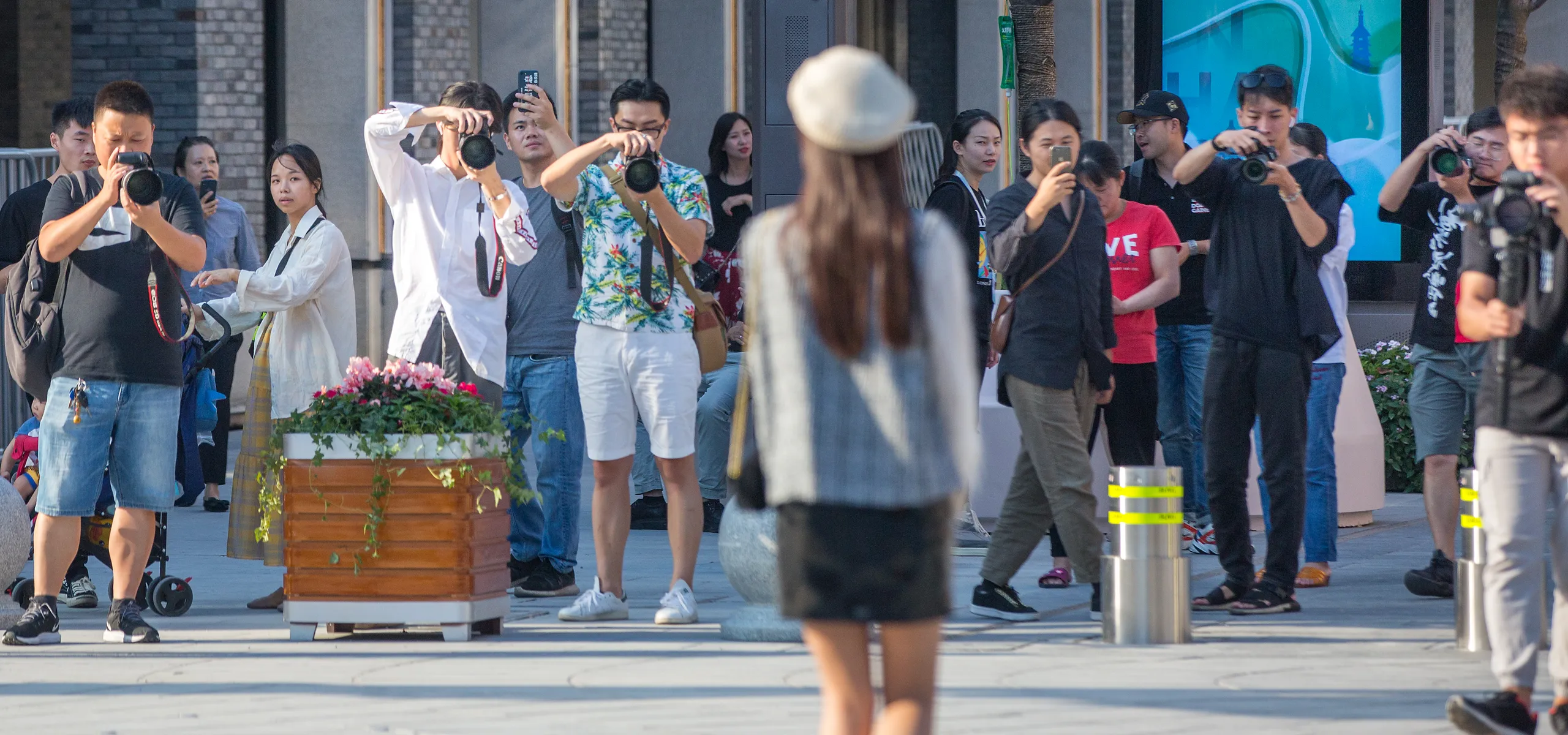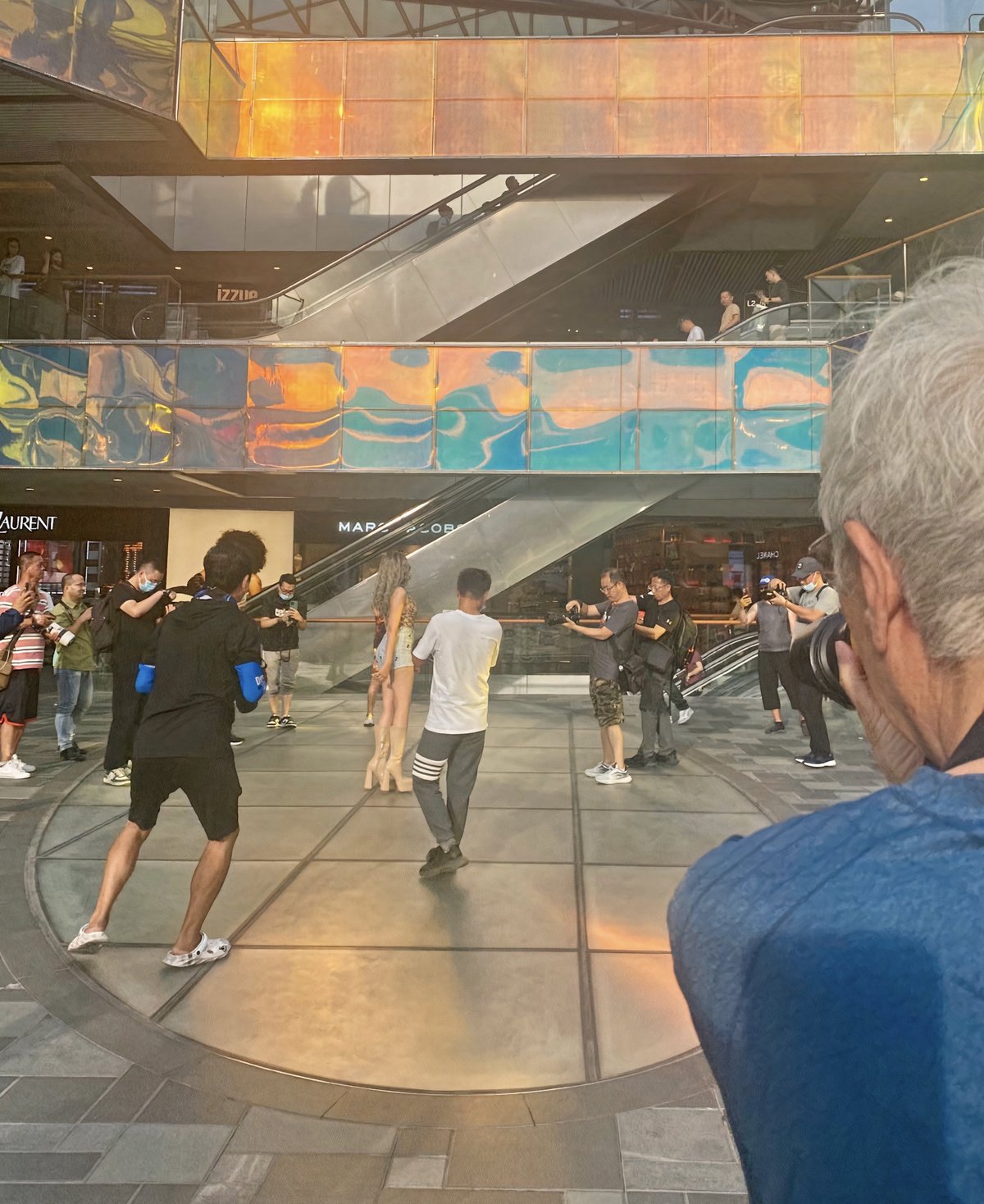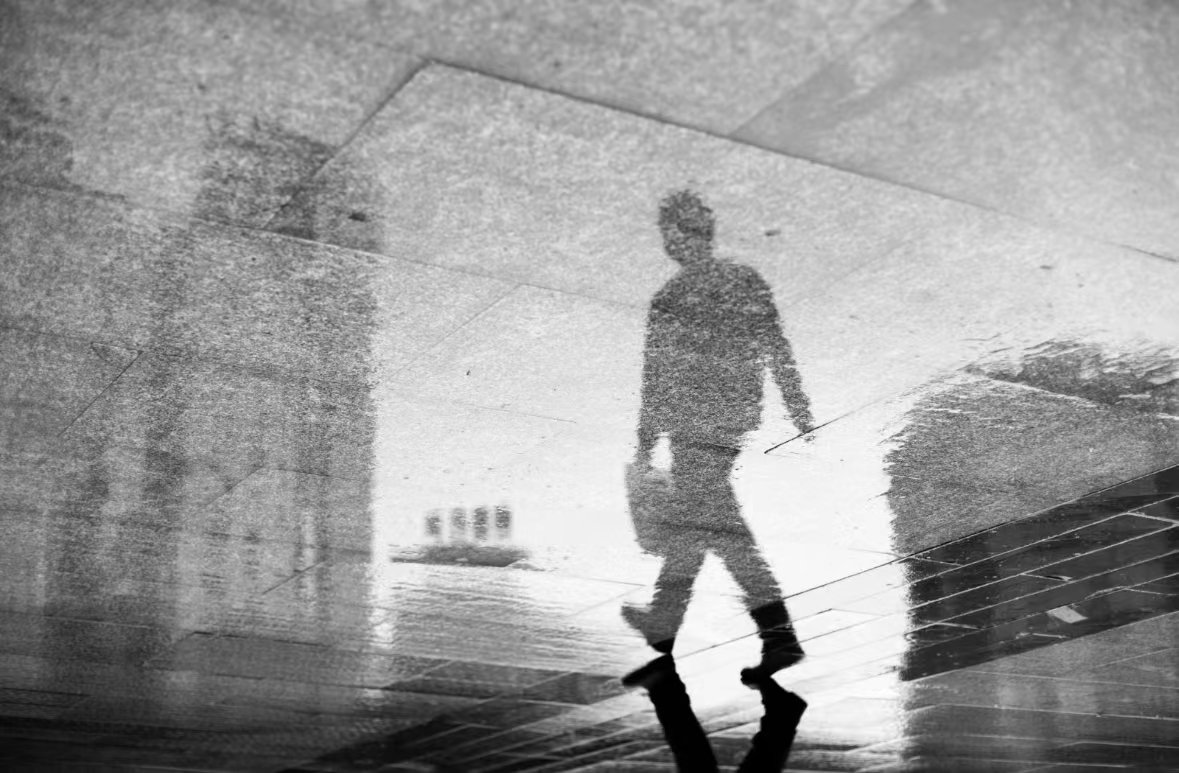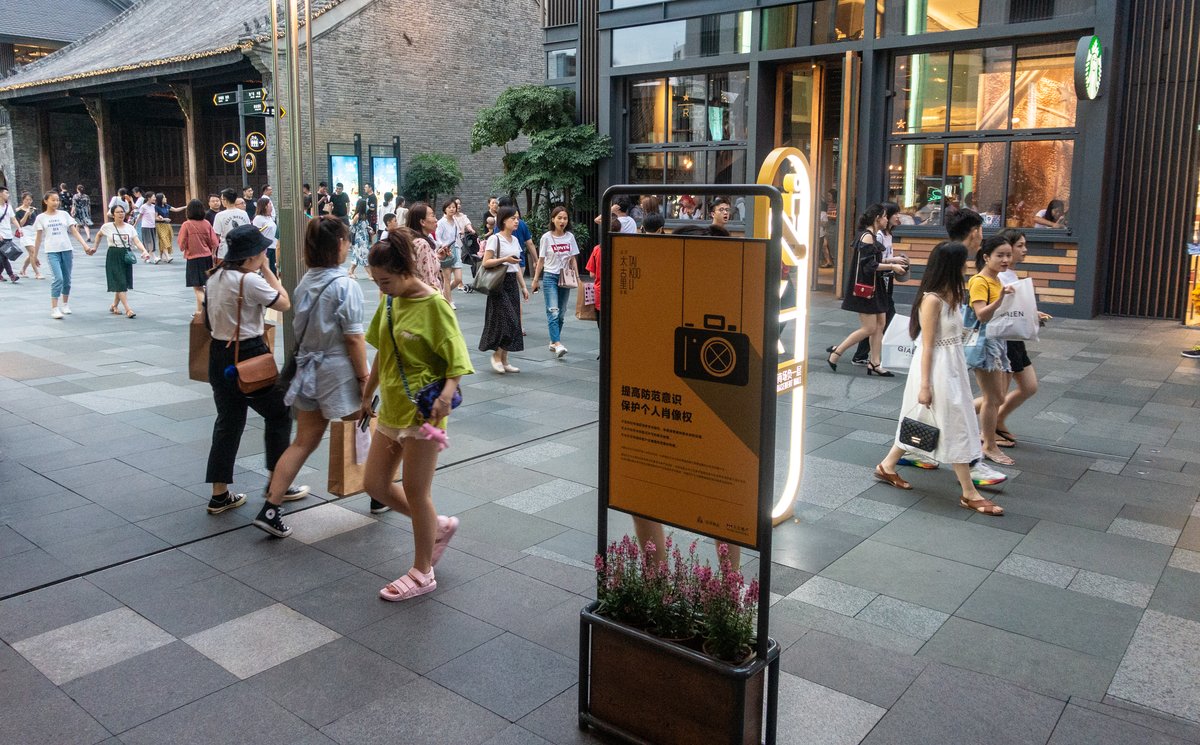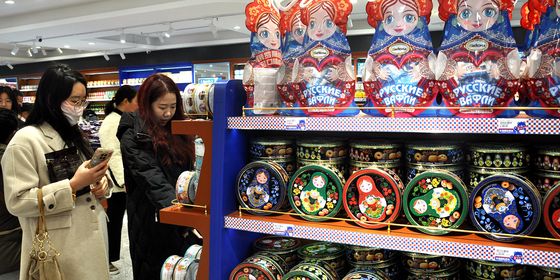After a recent scandal, street photographers face backlash for invasion of privacy and targeting young women
On a Saturday evening in June at Beijing’s upmarket Taikoo Li Sanlitun mall, Li Shaobai spots another target. “There goes a beautiful woman,” he says, abruptly breaking off his conversation with TWOC, readying his heavy black camera, and bustling forward to get a good angle of the young, slim, blond-haired woman.
Soon, a group of ten male photographers has gathered around the woman as she strides around in the sunshine in sparkling blue jean shorts, a tiger-print crop top, and high-heeled khaki boots. Li and his fellow photographers tail her every move for over an hour as she pauses to pose at different photogenic spots in the busy outdoor shopping complex.
Sanlitun is crawling with dozens of these photographers engaged in jiepai (街拍), or “street photography,” on most weekends. They are typically middle-aged or elderly men, hanging around the outdoor mall with (often high-end) cameras around their necks and a bag for their lenses over their shoulders. Just as ornithologists look to the skies for the rarest birds, they scour the crowds of shoppers for attractive subjects to snap. Similar groups are found at other luxury shopping locations: Shanghai’s Nanjing Road and Anfu Road, Chengdu’s Taikoo Li and Chunxi Road, Hangzhou’s Hubin Pedestrian Street and Kerry Center, and Beijing’s 798 art district.
The trend of street photography has existed for years, but recently the practice has been thrown into the spotlight again. On June 8, photographers in Chengdu, Sichuan province, snapped an executive at a state-owned petroleum company walking hand-in-hand with a female colleague who is not his wife. Videos and photos of the two quickly went viral online, and both were removed from their jobs soon after, pending an investigation by their company.
Hashtags related to the incident gained over 200 million views on Weibo in just a week or so, with netizens furiously debating whether jiepai photographers are infringing on people’s privacy (along with discussing the couple’s fashion choices). The scandal also highlighted this group’s propensity to photograph mainly young women, and whether it is legal for them to sell the images online to make money.
Street photography in China initially followed the lead of Western countries, mainly serving the needs of fashion magazines that proliferated in the 1980s and 90s. Photographers went out to capture fashionable trends and stylish individual pieces of clothing.
Later, social media platforms allowed street photography to reach a mainstream audience and encouraged photographers to snap whatever generated the most clicks. As in other countries, a large part of the Chinese internet became filled with sexualized images of women. Street photography later became integrated into e-commerce, with online sellers paying photographers for images of stylish trends, which they would then copy and sell to consumers.
Li, who is originally from Shandong province, believes street photography is a harmless hobby. He has been taking photos, mainly of women, for eight years, though he only started coming to Sanlitun in April. On Fridays, Saturdays, and Sundays, Li arrives at 5 p.m. and takes pictures for around three hours at a time, looking for female subjects he deems attractive. His motivation comes from a “deep admiration for the beauty of Chinese women,” he says, telling TWOC he doesn’t sell any of the photos he takes, but merely posts his favorites on his WeChat account for his friends and followers to see.
But many women find these groups of male photographers intimidating. Nihaa, a 25-year-old from Inner Mongolia who did not wish to give her full name, says she feels uncomfortable walking through Sanlitun when TWOC talked to her there on a recent Friday afternoon. “Those men who shamelessly photograph others under the guise of street photography are really disgusting,” she says. An article by Chinese magazine New Weekly on June 10 also attacked photographers for producing “vulgar content,” often targeting women with bare legs, aimed at farming clicks on social media: “In order to attract traffic, [photographers] will often use tags like ‘long legs,’ ‘good looking young woman,’ and ‘pretty woman with pale skin.’ On some platforms, users must pay extra to unlock full videos.”
“I’ve also heard friends say that the photos might be resold on online platforms and manipulated with techniques like face swapping,” Nihaa says, explaining her worries that photos of her could be used online without her consent, or even manipulated in unsavory ways.
This concern over privacy was evident even in the short time TWOC spent in Sanlitun. On the day TWOC met Li there, the blond woman appeared to welcome the photographers’ attention, but two other women hid their faces with their hands and walked faster when they noticed a photographer approaching them.
According to China’s Civil Code, which came into effect in 2021, individuals have rights to their own image. Chen Chaoyi, a lawyer at Shanghai Jinmao Law Firm, told Shangguan News in November last year that no organization or individual can infringe upon those rights without the consent of the right holder except for circumstances permitted by law. These include where it is “necessary for news reporting” or “protecting public interests and the rights of the individual,” none of which appear to apply to street photography.
Beijing-based lawyer Yi Yan told Legal Daily in June that people who are photographed in public have the right to demand their images be removed when they are posted without consent, and recommended photographers to “get permission from the subject before shooting” to avoid breaking the law.
But it is still difficult for people to avoid being snapped or to track down publishers of unsolicited images. “Many subjects only realize they have been photographed secretly when they find their images online,” the New Weekly article continued. The article also complained that social media platforms are slow to deal with complaints from users whose images were being used without their consent—it could take days or even weeks to get their image removed.
Li doesn’t ask for consent from his subjects, deeming it unnecessary. In Sanlitun, “Everyone wants to show off their beauty, show off the expensive or trendy clothes and shoes they bought,” he argues.
But others have faced pushback from the photos’ subjects. Zhang Youxie, a 43-year-old woman from Sichuan who has been a street photographer for five years—but doesn’t only snap attractive women—recounts one incident when someone she photographed tried to snatch her camera away because Zhang hadn’t asked for consent. “I was in a public place, capturing a scene of a nurse measuring someone’s blood pressure…I wasn’t breaking any laws. But even so, I had to apologize profusely,” Zhang, who asked to use a pseudonym for this piece, says. “Since then, I’ve tried to avoid capturing people’s faces.”
The right to one’s image becomes even more important when photographers intend to sell the photos or use them for marketing purposes, such as promoting clothing or accessories worn by individuals in the photographs. “After taking photos of people in Sanlitun, [some photographers] might combine and sell their pictures to people selling clothes on platforms like Douyin [China’s TikTok],” Li tells TWOC.
“I heard that some street snappers can earn up to 30,000 yuan a day by snapping people and selling the pictures to Taobao shops that make the fashionable clothing they are wearing,” says Ella Huang, a 23-year-old Xiaohongshu user from Chengdu who follows street photography for fashion tips and wished to use a pseudonym for this piece. A 2020 article by WeChat public account The Nature similarly claimed that photographers could earn up to 300,000 yuan a month from selling street photography videos to online clothes sellers.
When the Chengdu scandal broke, a host of online shops began selling replicas of his companion’s pink dress, and using images of her or of other women wearing similar clothing to advertise the dress online: “It was pretty. I wanted to buy it,” says Huang.
Since this incident, some popular street photography spots have introduced stricter rules on photography. Taikoo Li Chengdu (the shopping mall where the couple was snapped) banned street photography and posted staff ready to tell photographers to stop. When Huang visited the mall a week after the scandal broke, she saw people taking photos with their mobile phones, “but I did not see any photographers with professional cameras,” she says. In fact, the mall had posted a note on its WeChat account back in 2019 stating it “does not support photography that infringes upon consumers’ image rights or commercial photography without permission,” but it appears there had been little action beyond this statement until this year.
On June 9, Sanlitun Taikoo Li posted on its WeChat public account that it had placed signs reminding customers to “enhance their awareness of personal image rights and protection…Sanlitun Taikoo Li does not support any unauthorized commercial photography activities and has a formal channel for commercial photography applications.” But the continued presence of dozens of photographers, conspicuous with their large lenses and camera bags, suggests there is no enforcement of these rules.
Meanwhile, management of the Hangzhou Hupan Pedestrian Street, another street photography hot spot, told China Blue News, a subsidiary of the state-owned Zhejiang Media Group, that “street photography is permissible as long as it does not disturb tourists or attract crowds.”
Photographer Zhang, however, believes the trend has gone too far. “I fully support the prohibition of photography in Taikoo Li. Those people with cameras are only interested in women who dress provocatively. Some photography groups even focus on capturing women wearing yoga pants or photographing them from awkward angles. I can only say that their interests have nothing to do with photography.”
Not everyone is in favor of a ban. As one netizen put it in a Weibo comment under the news of the Chengdu controversy: “If it weren’t for street photography, how would this scandal be exposed? Street photography also has a meaningful side.”
In the meantime, “all I can do is hope that there won’t be any incidents that harm people or invade their privacy,” says Nihaa.
Additional reporting by Wei Wenli (魏文梨) and Sam Davies





